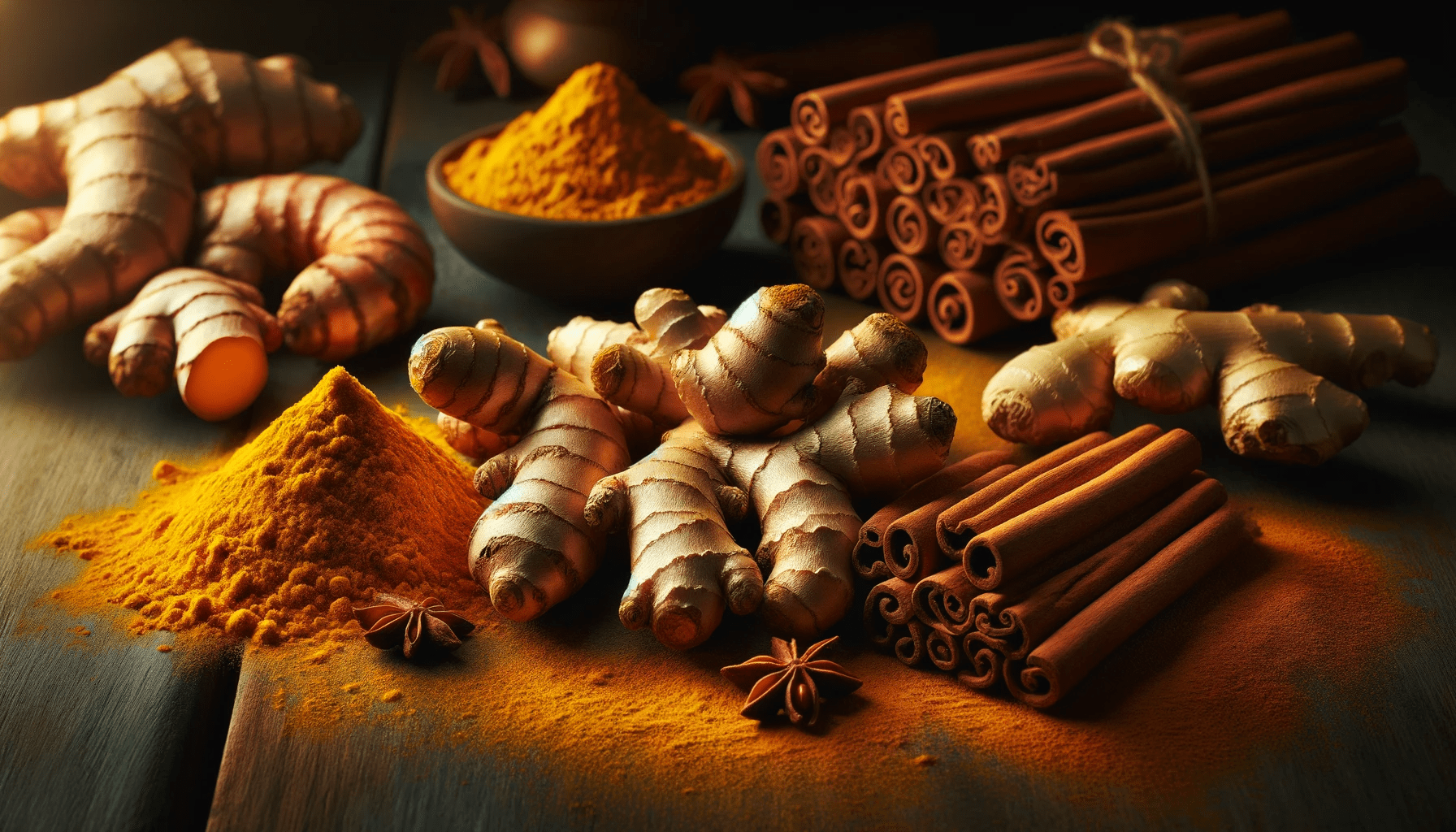The use of spices like turmeric, ginger, and cinnamon goes beyond just adding flavor to our food. These spices have been used in traditional medicine for centuries and are now being recognized for their health benefits in scientific research. This article delves into the health benefits of these common spices, supported by scientific studies.
Turmeric: The Golden Spice
Turmeric, scientifically known as Curcuma longa, is a bright yellow spice known for its presence in Indian cuisine and its use in Ayurvedic medicine.
Anti-inflammatory and Antioxidant Properties: One of the most well-researched benefits of turmeric is its anti-inflammatory and antioxidant properties, mainly attributed to curcumin, its active compound. A study in the "Journal of Medicinal Chemistry" highlights curcumin’s potent anti-inflammatory effects, which are comparable to over-the-counter medications like ibuprofen but without the side effects【1】.
Potential Role in Cancer Prevention and Treatment: Research suggests that curcumin may play a role in cancer prevention and treatment. A review in "Cancer Letters" discusses how curcumin can affect cancer growth and development at the molecular level【2】.
Benefits in Managing Arthritis: The anti-inflammatory properties of turmeric have also been found beneficial in managing arthritis. A clinical trial published in the "Journal of Medicinal Food" showed significant improvement in the symptoms of arthritis patients treated with curcumin compared to controls【3】.
Ginger: More Than Just a Digestive Aid
Ginger, or Zingiber officinale, is widely used for its strong, spicy flavor and for its medicinal properties, especially as a digestive aid.
Relief from Nausea and Indigestion: Ginger is well-known for its ability to alleviate nausea and vomiting. This has been particularly noted in pregnancy, where a study in "Obstetrics & Gynecology" showed ginger’s effectiveness in treating pregnancy-related nausea and vomiting【4】.
Anti-inflammatory Effects and Pain Relief: Like turmeric, ginger also possesses significant anti-inflammatory properties. Research in "The Journal of Pain" suggests that daily ginger consumption can reduce exercise-induced muscle pain by 25%【5】.
Cardiovascular Health: Ginger may also contribute to heart health by reducing blood pressure and preventing heart attacks. A study in "Nutrition" demonstrated that ginger extract could lower blood pressure in hypertensive individuals【6】.
Cinnamon: The Sweet Spice with Medicinal Properties
Cinnamon, derived from the bark of Cinnamomum trees, is known for its sweet and warm flavor and has been used medicinally around the world.
Blood Sugar Control: Cinnamon is perhaps most famous for its effects on blood sugar levels. It can mimic insulin, a vital hormone for blood sugar regulation. The "Journal of Diabetes Science and Technology" published a review detailing cinnamon’s potential in improving glucose and lipid levels in patients with type 2 diabetes【7】.
Antioxidant and Anti-inflammatory Properties: Cinnamon is packed with antioxidants, which protect your body from oxidative damage. The "Journal of Agricultural and Food Chemistry" showed that cinnamon is one of the top spices/herbs in terms of antioxidant content【8】.
Neurodegenerative Diseases: Emerging research suggests cinnamon’s potential in neurodegenerative diseases. A study in "Neuroimmune Pharmacology" pointed out that cinnamon and its metabolites might help in preventing Alzheimer’s disease【9】.
Conclusion
Turmeric, ginger, and cinnamon are not just culinary staples but also possess significant health benefits. From anti-inflammatory properties to aiding in blood sugar control, these spices offer natural ways to boost health and prevent disease.
References
- Jurenka J.S. (2009). "Anti-inflammatory properties of curcumin, a major constituent of Curcuma longa: a review of preclinical and clinical research." Journal of Medicinal Chemistry.
- Aggarwal B.B., Kumar A., Bharti A.C. (2003). "Anticancer potential of curcumin: preclinical and clinical studies." Cancer Letters.
- Chandran B., Goel A. (2012). "A randomized, pilot study to assess the efficacy and safety of curcumin in patients with active rheumatoid arthritis." Journal of Medicinal Food.
- Vutyavanich T., Kraisarin T., Ruangsri R. (2001). "Ginger for nausea and vomiting in pregnancy: randomized, double-masked, placebo-controlled trial." Obstetrics & Gynecology.
- Black C.D., Herring M.P., Hurley D.J., O'Connor P.J. (2010). "Ginger (Zingiber officinale) reduces muscle pain caused by eccentric exercise." The Journal of Pain.
- Akinyemi A.J., Thome G.R., Morsch V.M., Bottari N.B., Baldissarelli J., de Oliveira L.S., Goularte J.F., Belló-Klein A., Oboh G., Schetinger M.R.C. (2015). "Effect of Ginger and Turmeric Rhizomes on Inflammatory Cytokines Levels and Enzyme Activities of Cholinergic and Purinergic Systems in Hypertensive Rats." Nutrition.
- Anderson R.A., Broadhurst C.L., Polansky M.M., Schmidt W.F., Khan A., Flanagan V.P., Schoene N.W., Graves D.J. (2004). "Isolation and characterization of polyphenol type-A polymers from cinnamon with insulin-like biological activity." Journal of Diabetes Science and Technology.
- Shan B., Cai Y.Z., Sun M., Corke H. (2005). "Antioxidant capacity of 26 spice extracts and characterization of their phenolic constituents." Journal of Agricultural and Food Chemistry.
- Peterson D.W., George R.C., Scaramozzino F., LaPointe N.E., Anderson R.A., Graves D.J., Lew J. (2009). "Cinnamon extract inhibits tau aggregation associated with Alzheimer's disease in vitro." Journal of Neuroimmune Pharmacology.
Discover turmeric, ginger and cinnamon on the Amazon store : link

Leave a comment